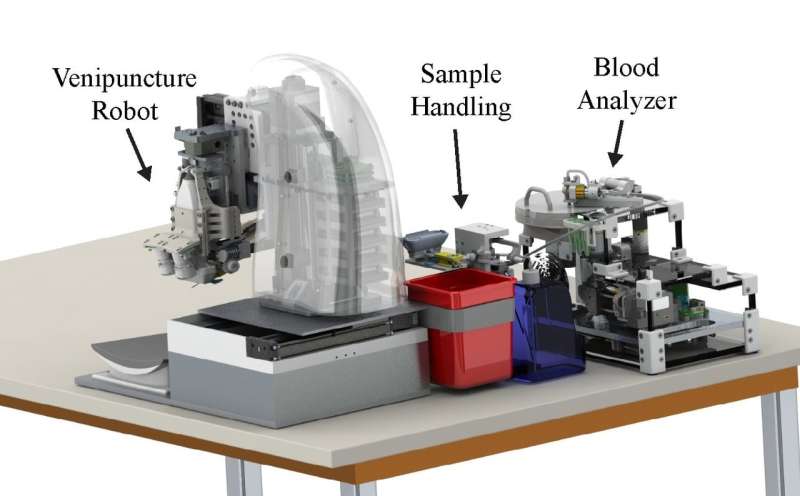Researchers develop automated robotic device for faster blood testing

Rutgers researchers have created an automated blood drawing and testing device that provides rapid results, potentially improving the workflow in hospitals and other health-related institutions to allow health care practitioners to spend more time treating patients.
A study describing the fully automated device is published online in the journal Technology.
"This device represents the holy grail in blood testing technology," said Martin L. Yarmush, senior author of the study and Paul & Mary Monroe Endowed Chair & Distinguished Professor in the Department of Biomedical Engineering at Rutgers University-New Brunswick. "Integrating miniaturized robotic and microfluidic (lab-on-a-chip) systems, this technology combines the breadth and accuracy of traditional blood drawing and laboratory testing with the speed and convenience of point-of-care testing."
Diagnostic blood testing is the most commonly performed clinical procedure in the world, and it influences most of the medical decisions made in hospitals and laboratories. But the success rate of manually drawing blood samples depends on clinicians' skill and patient physiology, and nearly all test results come from centralized labs that handle large numbers of samples and use labor-intensive analytical techniques.
So, a Rutgers biomedical engineering research team created a device that includes an image-guided robot for drawing blood from veins, a sample-handling module and a centrifuge-based blood analyzer. Their device provides highly accurate results from a white blood cell test, using a blood-like fluid spiked with fluorescent microbeads. The testing used artificial arms with plastic tubes that served as blood vessels. The device could provide rapid test results at bedsides or in ambulances, emergency rooms, clinics and doctors' offices.
"When designing the system, our focus was on creating a modular and expandable device," said Max Balter, who led the study and holds a doctorate in biomedical engineering from Rutgers. "With our relatively simple chip design and analysis techniques, the device can be extended to incorporate a broader panel of tests in the future."
More information: M.L. Balter et al, Automated end-to-end blood testing at the point-of-care: Integration of robotic phlebotomy with downstream sample processing, TECHNOLOGY (2018). DOI: 10.1142/S2339547818500048


















